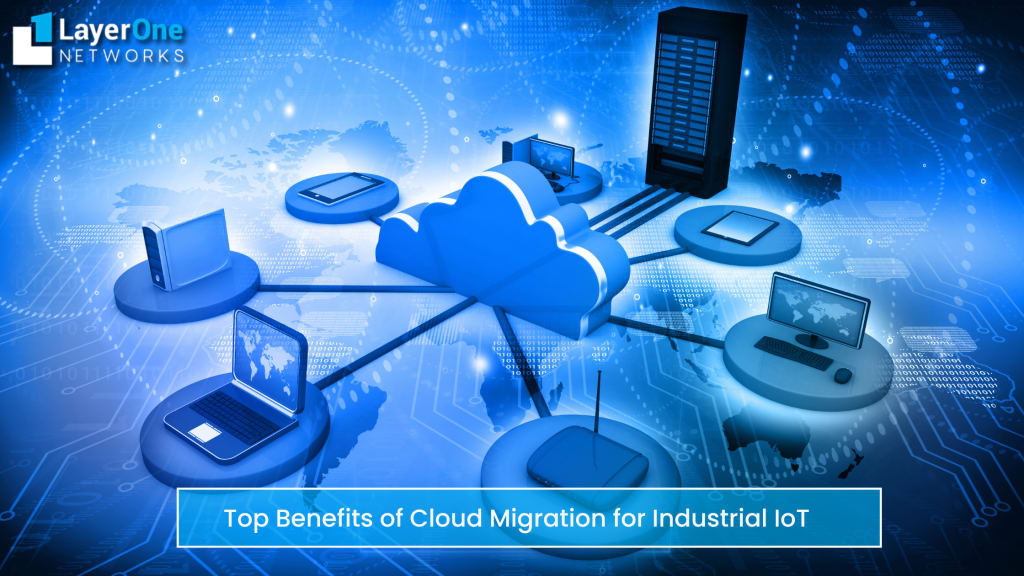Top Benefits of Cloud Migration for Industrial IoT
Cloud migration offers a range of advantages for industrial IoT systems. Discover the top benefits of migrating to the cloud and see how to leverage cutting-edge technology.

Moving Industrial IoT (IIoT) applications to the cloud is a common solution for companies aiming to improve efficiency, minimize operational expenses, and expand scalability. Businesses can use cloud computing services from well-known providers like Amazon Web Services (AWS), Google Cloud Platform (GCP), or Microsoft Azure to take advantage of all the benefits of cloud technology.
Cloud computing services providers have significantly changed business operations by offering many advantages. Transferring industrial data, applications, and processes to cloud computing platforms is called cloud migration for IIoT. This approach offers more advantages than traditional on-premise solutions.
The top advantages of moving industrial IoT applications to the cloud will be covered in this blog post, along with how cloud computing service providers may assist businesses in achieving these advantages.
What is Cloud Migration?
Cloud migration transfers data, applications, and other business processes from on-premise computing infrastructure to cloud-based platforms. This process has become increasingly popular among IT consulting firms as it provides access to the latest technology and services to improve efficiency, reduce operational costs, and increase scalability.
Cloud migration for Industrial IoT involves transferring IIoT data, applications, and processes from on-premise systems to cloud computing platforms. Businesses can improve their Industrial IoT applications' performance, flexibility, and scalability by utilizing cloud computing infrastructure and its features.
7 Advantages of Using a Cloud Platform in the Context of the Internet of Things

Switching to a cloud platform and using cloud computing can make your business operations easier and help it grow. There are seven main benefits to these changes:
1. Scalability
One of the main advantages of deploying IoT systems on the cloud is its capacity to scale. If your IT consulting company plans to deploy IoT, expanding the on-premise network infrastructure would be costly in terms of time and money. Buying and configuring hardware can be challenging, and maintenance would be daunting.
Cloud computing allows enterprises to expand their infrastructure by adding more cloud space and increasing storage capacity without additional setup. This lowers development expenses and expedites the development process. IoT cloud platform services are also flexible in scaling down IoT-enabled devices.
2. Cost Savings
Storing your data on-site requires you to purchase and install more hardware than you currently need in case you need more storage space. By shifting your industrial IoT systems to the cloud, you can avoid the upfront costs of buying and setting up hardware and software.
By only paying for the storage you use, cloud-based systems allow you to save money. Additionally, they simplify scaling up in the event of unanticipated development or traffic. This lets you manage your budget efficiently by using resources more optimally.
3. Increased Security
Contrary to popular belief, storing data in the cloud can provide stronger security measures compared to traditional on-premise storage. By adopting cloud technology, businesses can leverage advanced security features like robust authentication and access control, effective data loss prevention tools, and comprehensive encryption protocols for both data in transit and at rest.
Moreover, cloud service providers enhance their infrastructure with the latest high performance technologies to offer even better security benefits to their customers. By embracing BaaS, companies can take advantage of the secure and reliable backup solutions offered by cloud service providers, allowing them to focus on their core business operations with peace of mind.
4. Data Mobility

Businesses may quickly access their data via the cloud anywhere, allowing staff to collaborate while working remotely safely. Cloud services available on numerous platforms, such as computers, cellphones, and tablets, improve team collaboration and increase this convenience.
The Internet of Things (IoT) offers data services to various devices, including smart factories, self-driving cars, sensor networks, smartphones, smartwatches, and smart cards. Many of these devices can already be moved around or are being developed to be more mobile. Additionally, all IoT systems need to manage connected devices in real-time.
5. Reliability and Resiliency
Although occasional downtime may occur, cloud infrastructure is usually more dependable than on-premises infrastructure. As a result, your workload will probably see fewer interruptions, increasing your availability and uptime. In addition, recovering from a cloud failure is often easier than restoring workloads on-premises.
You can migrate automatically to a different cloud region if your primary region fails or even move to a different cloud as required. Cloud infrastructure makes it easier to maintain business continuity by facilitating the rapid creation of additional instances as needed. This is more efficient in a breakdown than building new infrastructure from scratch.
6. Extensibility and Microservices
In cloud environments, you can use multiple services simultaneously, such as virtual machines, application services in containers, functions that work without a server, databases, and object storage. Your workloads can be deployed to any cloud service you choose with a minimum amount of configuration and deployment labor.
By utilizing microservices, businesses can focus on developing and deploying their applications without worrying about building dependencies from the ground up for scalability and personalization. Configuring and maintaining multiple services in an on-premises environment from the beginning would require a lot of effort.
7. Enhanced Efficiency
Cloud-based industrial applications can create an environment of efficiency and automation. Cloud service providers offer quick and reliable access to the data you need when needed, giving you greater flexibility in how your business operates. This makes it possible for IoT devices to use automated processes like machine learning algorithms, AI models, big data analytics, and predictive maintenance.
Because cloud vendors often offer flat rates for their services and only charge you for the resources you use, cloud-based industrial applications can also help you cut costs. Businesses can save money by storing data off-site instead of on their premises without compromising quality and performance.
Related Posts: Cloud Computing Service Benefits to Manufacturing Industry
Conclusion
Businesses looking to improve cost-effectiveness and efficiency should consider moving to the cloud. By cloud managed services, companies can gain benefits such as enhanced security, data mobility, reliability, resiliency, efficiency, access to microservices, and extensibility.
The cloud's scalability, flexibility, and cost-efficiency will help businesses stay ahead of the competition. Cloud migration allows businesses to remain competitive as IoT devices grow in sophistication and prevalence.
About the Creator
Layer One Networks
We are IT Consulting Firm that helps to upsurge your business growth with our highly skilled team of IT experts. We provide the best IT support such as firewall protection, cloud services, VoIP, help desk, and server support.






Comments
There are no comments for this story
Be the first to respond and start the conversation.